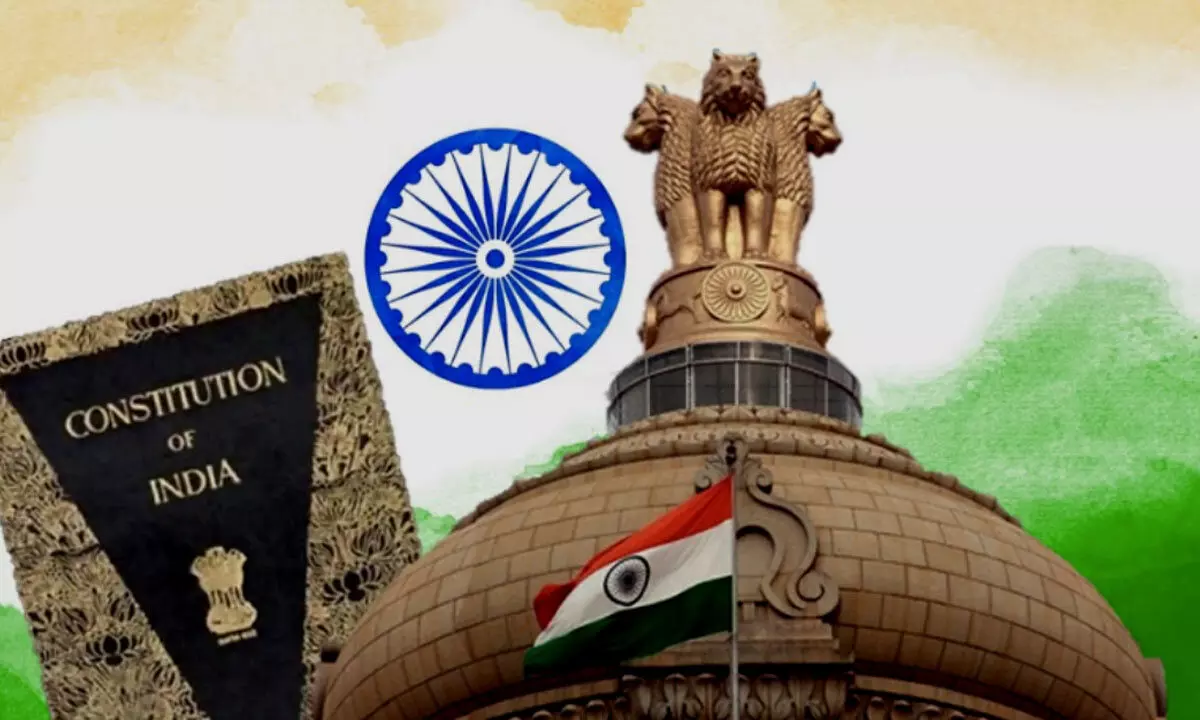Live
- They always want me to win, and now I feel lucky to have been offered a story like ‘Zebra’: Satyadev Kancharana
- ‘Democracy first, humanity first’: PM Modi in Guyana's parliament on two countries' similarities
- PKL Season 11: Telugu Titans register third straight win to top standings
- Is Pollution Contributing to Your COPD?
- NASA Unveils Underwater Robots for Exploring Jupiter's Moons
- Additional Central forces arrive in violence-hit Manipur
- AR Rahman and Saira Banu’s Divorce: Legal Insights into Common Issues in Bollywood Marriages
- 82.7 pc work completed in HPCL Rajasthan Refinery area: official
- Curfew relaxation extended in 5 Manipur districts on Friday
- Tab scam prompts Bengal govt to adopt caution over fund disbursement
Just In
Short Sessions, Lengthy Harangues By Telugu CMs


India boasts of its federal structure, and the Constitution clearly explains the role of law-making bodies, Parliament and state legislatures.
India boasts of its federal structure, and the Constitution clearly explains the role of law-making bodies, Parliament and state legislatures.
It clearly states that the legislature is the law-making body of the State. It is first among the three organs of the state. It can make laws as well as administer the government. The purpose of these legislatures is to discuss, debate and then frame laws for the benefit of people of the state so that their aspirations can be fulfilled, and their expectations can be met.
But, the disturbing trend that had emerged in the last decade, particularly in the two Telugu states of Telangana and Andhra Pradesh, is that it has become a formality to meet the Constitutional obligation. The importance of the Assembly has thus suffered a dent. The Assembly sessions in these two states are the briefest.
The Constitution does not say as to how many days a State Assembly should ideally meet. But the National Commission to review the working of the Constitution headed by the 25th Chief Justice of India M N Venkatachalaiah had prescribed that Assembly with less than 70 members should meet for at least 50 days a year. Larger houses should meet for at least 90 days a year.
The presiding officers’ conference held at Gandhinagar in January 2016 suggested that the legislatures should hold a minimum 60 days of sittings in a year. Statistics indicate that between 2016 and 2021, 23 state assemblies met for an average of 25 days. Kerala tops the list with 61 days session, followed by Odisha 43 days, Karnataka 40 days, Tamil Nadu 34 days, Bihar 32 days, Himachal Pradesh 31 days Rajasthan Assam and Jharkhand 26 days, Gujarat 24 days. Telangana and Andhra Pradesh account for around 15 to 20 days each.
Various commissions and presiding officers’ conferences insisted on higher number of sittings, not because the members would get allowances but because increased sittings provide an opportunity to discuss larger number of issues related to the state. It enables all the members to bring forward the problems and issues related to their respective constituencies and get them redressed in the form of healthy discussions and debates.
But it is most regrettable that the state governments are now running away from this kind of healthy system of governance and are converting it into party- and vote-driven agenda and refuse to allot adequate time to the opposition. Assembly sessions are increasingly becoming platforms to blow their own trumpet, making all kinds of comments against the opposition parties or the previous governments.
We are seeing how ministers and chief ministers consume about 3 to hours, if not more, to speak about the government schemes and try to belittle the opposition, without giving any chance for them to put up counter arguments. Opposition members are suspended if they insist that they be given a proper chance.
Even bills are not discussed at length and are passed by voice vote in a jiffy. This certainly does not indicate efficient and effective governance. If the number of sittings is more and if an atmosphere for healthy debate and discussion is created, then it would enable the government to take correct decisions instead of wanting the house to endorse what the CM thinks ignoring the other side of the argument.
In the bygone decades, both in Parliament and Assemblies, sometimes even 12 to 14 hours of time was spent on discussing important issues. In case serious differences arose between the opposition and the ruling party, the matter was referred to a select committee.
The functioning used to be systematic. The day used to begin with question hour, followed by zero-hour, short discussion and debates on important matters. But now it is short session long lectures by leader of the house. Opposition hardly gets a chance. It’s time the Speakers take a serious call on this and play a key role in protecting the time-tested practices that were established since Independence.

© 2024 Hyderabad Media House Limited/The Hans India. All rights reserved. Powered by hocalwire.com






